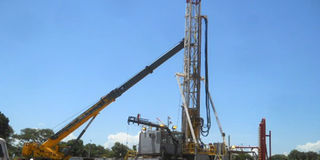Government needs $1b for oil projects

Government has been steadfast in investing in oil and ensuring that Uganda achieves commercial production by at least 2023. FILE PHOTO
What you need to know:
- As of last September last year Uganda consumed 85 million litres of petroleum products out of which 34.6 million litres was petrol, 42.5 million litres diesel and 2.6 million litres of kerosene.
- Dr Josephine Wapakabulo, the UNOC chief executive director, said yesterday they “filtering a lot of what we do” to avoid being bogged down.
Kampala. Government, through Uganda National Oil Company (UNOC) needs in the excess of $1b (about Shs3.8 trillion) to finance its stake in the upstream and midstream projects leading to commercial oil production.
Three quarters of the $1b will cover government’s stake in the proposed East African Crude Oil Pipeline and the Greenfield 60,000 barrels per day (bpd) oil refinery.
The two projects are pegged to a capital expenditure of $7.5b (Shs28 trillion) to be raised through a mix of debt and equity.
On the other hand is development of the oil fields by the oil companies, France’s Total E&P and China’s Cnooc, tagged to a cost of $6.7b (Shs24trillion).
UNOC’s stake in the venture will be borne by the oil companies up to when the agency has gained the financial muscle.
UNOC is also looking at participating in investment in the proposed Kabaale Industrial Park in Hoima, which will host the oil refinery, the crude pipeline export hub and other supporting amenities like warehouses and freight and forwarding unit.
This is besides the Kampala storage terminal in Buloba, which will serve as a distribution centre for refined oil products.
Dr Josephine Wapakabulo, the UNOC chief executive director, said yesterday they “filtering a lot of what we do” to avoid being bogged down.
Speaking at a media workshop in Kampala, he said UNOC was “doing a lot of benchmarking elsewhere … to back everything we are trying to do”.
UNOC handles Uganda’s commercial interests in the oil sector, including proposing new upstream, midstream and downstream ventures locally and internationally.
Several other African national oil companies from Ghana, Algeria, South Africa and Cote d’Ivoire, among others have had such big ambitions too but the absence of substantial infusion of capital has made it difficult.
However, Ms Proscovia Nabbanja, the UNOC chief operating officer for Upstream, said: “It’s prudent and innovative to look at the projects as not overly ambitious but rather at what the country will be in 20 or 40 years.”
Dr Michael Mugerwa, the Uganda Refinery Holding Company general manager described the refinery as a “worthwhile investment” given its “extremely attractive internal rate of return.”
The Uganda Refinery Holding Company is one of the two subsidiaries of UNOC. The other is the National Pipeline Company, which also recently took over the Jinja fuel reserves under a PPP arrangement.
Consumption
As of last September last year Uganda consumed 85 million litres of petroleum products out of which 34.6 million litres was petrol, 42.5 million litres diesel and 2.6 million litres of kerosene.
Jet fuel imports stood at 5 million litres. These will all be made locally once the refinery is in place.
In April government in signed a project framework agreement with the Albertine Graben Refinery Consortium, a venture of American and Italian firms, to design, finance, construct and maintain a 60,000 barrels per day (bpd) oil refinery in Hoima District.




